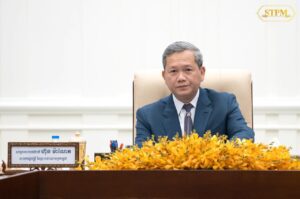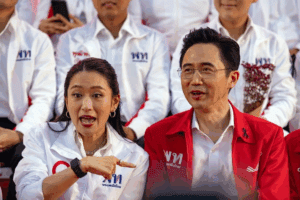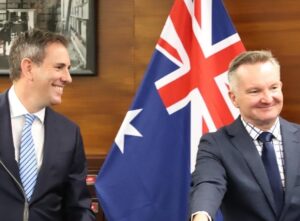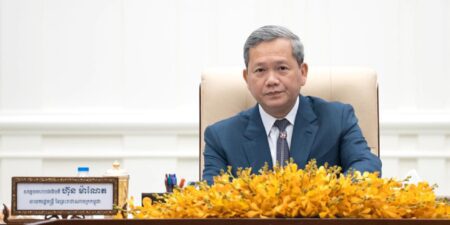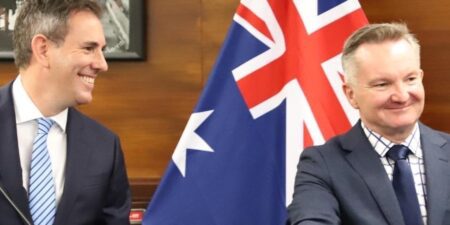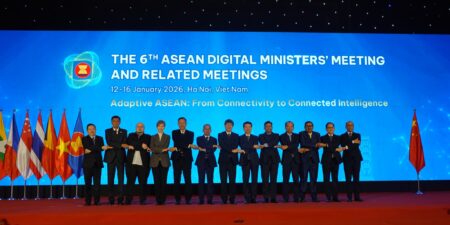
Thai Cabinet Reshuffle Strengthens PM Srettha’s Hand

BGA Thailand Senior Adviser Thitinan Pongsudhirak wrote an update analyzing Thailand’s latest Cabinet reshuffle.
Thailand’s much-anticipated Cabinet reshuffle has transpired with unexpected drama and cold consolidation in equal measure. As head of a coalition government, Prime Minister Srettha Thavisin now appears more “prime ministerial” as the reshuffle has strengthened his hand to implement the ruling Pheu Thai Party’s flagship policies. Because other coalition partners remain satisfied with their portfolio allotments and operational autonomy, political stability is on course, with Srettha secured at the helm for the foreseeable future. While headwinds abound from lower external demand, ongoing geoeconomic volatility and disruption to global production and supply chains from the U.S.-China confrontation, Thailand’s economy will likely benefit from political continuity and policymaking concentration among coalition parties ahead of the next election by mid-2027.
As uneasy weeks rolled into eight months as prime minister, Srettha’s favorable performance curve has enabled him to rise from a novice and newcomer in Thai politics to a savvy operator at the top of government. Earlier rumors of him being replaced by Paetongtarn Shinawatra, the 37-year-old youngest daughter of Pheu Thai founder and ousted former Prime Minister Thaksin Shinawatra, have fallen by the wayside. Perceptions of Thaksin, who returned to Thailand last August after 15 years in exile, being puppet master with Srettha as a stage proxy also have lost ground.
Among the faces in Pheu Thai’s Cabinet domain who were rotated in and out, two clusters stand out. Srettha, who has doubled as finance minister until now, brought in Pichai Chunhavajira as deputy prime minister and new finance minister. Pichai, 75, has been Srettha’s economic adviser from the outset. Formerly board chairman of the Stock Exchange of Thailand, Pichai’s background is in energy, finance and state enterprises. An old hand in Thailand’s big business networks, Pichai has known Srettha and Thaksin for years. That he has taken charge of the finance portfolio enables Srettha to oversee government functions more closely, especially the rollout of Pheu Thai’s signature THB 500 billion ($13.6 billion) digital wallet scheme — THB 10,000 ($270) each for 50 million Thais over 16 years of age — later this year to boost consumption and shore up economic growth.
Along with Pichai, Srettha added three deputy ministers of finance who are relatively younger and seen as policy professionals. Having four ministers supervising the Finance Ministry is unprecedented and indicates Srettha’s fiscal policy priorities and pro-growth determination. In addition, Srettha installed three new ministers attached to the Prime Minister’s Office, partly in return for their contributions as Pheu Thai cadres. A couple of party patronage bosses from Thaksin’s time in power two decades ago were also rewarded: Suriya Juangroongruangkit became a deputy prime minister and transport minister and Somsak Thepsutin took over the public health portfolio. On the whole, Pheu Thai’s reshuffle of its Cabinet quota was intended both to reward party contributors and loyalists and consolidate Srettha’s premiership with an eye to drive and facilitate broader policy objectives, including fiscal stimulus, free trade agreements, infrastructure projects, foreign affairs and “soft power” schemes.
Pheu Thai’s rank-and-file constituency members of Parliament may feel resentful and alienated in this reshuffle because they were superseded by party-list counterparts and experts from outside the party. However, Thaksin, Paetongtarn and senior party leaders should be able to maintain intra-party cohesion, while Srettha may rotate Pheu Thai’s Cabinet lineup again after six months to keep up government performance and placate intra-party gripes. Other major coalition partners, particularly the pro-military Bhumjaithai, Palang Pracharat and United Thai Nation parties, appear content with their lot in the reshuffle, which took place without any major squabbling. Palang Pracharat has consolidated its hold over the Agriculture Ministry, which looks after myriad rural voters. Thamanat Prompow continues as agriculture minister but now with another deputy minister from Palang Pracharat. It bodes well for policy effectiveness that the coalition parties are aiming ahead to up their electoral results in the next poll.
With the opposition Move Forward Party poised to be dissolved after mid-May, when its petition period with the Constitutional Court ends, the governing coalition led by Srettha and underpinned by Pheu Thai is expected to soldier on indefinitely. Srettha’s strategy and Pheu Thai’s direction under Thaksin’s influence appear intent on adopting some of Move Forward’s reform proposals, such as cutting back on military prerogatives, increasing wages, promoting domestic consumption, attracting foreign investment and assuming a bigger role in regional and international affairs, while staying clear of monarchy reforms. A revamp of the constitution, for example, will go ahead, exempting the foremost sections on the role and authority of the monarchy. Pheu Thai is banking on a partial reform agenda over the next few years in office to get the economy moving again and indirectly benefit from Move Forward’s disbandment in an overall effort to regain electoral ground that was lost in the last election.
Notwithstanding these Cabinet maneuvers, the foreign affairs portfolio stole the media show. Erstwhile Foreign Minister and Deputy Prime Minister Parnpree Bahiddha-nukara abruptly resigned within hours after the new Cabinet composition was announced in the Royal Gazette. A Pheu Thai policy hand for decades, Parnpree felt slighted for having his deputy premiership withdrawn, ending up solely as foreign minister. As he has made headway on key policy challenges — from the Myanmar crisis and the detention of Thai workers in Gaza to the omnidirectional engagements with the major powers, particularly the United States and China — his departure is a setback for the government. In turn, Srettha and the Prime Minister’s Office are expected to pitch in on foreign policy more actively behind newly appointed Foreign Minister Maris Sangiampongsa, a veteran diplomat who was posted to Canberra, Wellington and Ottawa prior to retirement. Thai foreign policy will need to pick up momentum, but its directions of balancing among the great powers and leading with economic growth considerations are here to stay.
We will continue to keep you updated on developments in Thailand as they occur. If you have comments or questions, please contact BGA Senior Adviser Thitinan Pongsudhirak at thitinan@bowergroupasia.com and BGA Thailand Managing Director Teerasak “Art” Siripant at tsiripant@bowergroupasia.com.
Best regards,
BGA Thailand Team

Dr. Thitinan Pongsudhirak
Senior Advisor
















